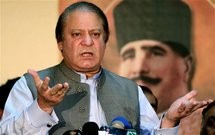 Neither the Pakistani government not the Pakistani Taliban is seriously engaging in talks to try to end the seven-year insurgency in the country, despite recently announced calls for negotiations.
Neither the Pakistani government not the Pakistani Taliban is seriously engaging in talks to try to end the seven-year insurgency in the country, despite recently announced calls for negotiations.
On the contrary, each side is using the prospect of talks to gain leverage over the other. Eventually there will be some sort of deal toward a negotiated settlement, but that deal will not materialize anytime soon. More important, any deal would depend on the outcome of the peace talks between the United States and the Afghan Taliban.
Muawiya, the leader of a faction of fighters from Punjab province, reacted positively to a call by recently elected Pakistani Prime Minister Nawaz Sharif for negotiations with the jihadist rebels. Muawiya specifically welcomed Sharif's decision to temporarily stop the executions of prisoners on death row, including several leading Taliban figures, saying that the prime minister has shown political maturity and has "strengthened the wish of peace by suspending punishment for prisoners." Shahidullah Shahid, the spokesman for the main Taliban rebel group, the Tehrik-i-Taliban Pakistan, said that Muawiya's remarks reflected his own opinion but added that the Pakistani Taliban leadership would discuss Sharif's offer at a Aug. 23 meeting.
This is not the first time Muawiya (which is a nom de guerre) has shown interest in talks. In December 2012, he outlined conditions for peace talks that included imposing an austere interpretation of Islamic law and ending Islamabad's alliance with Washington. Pakistani Taliban chief Hakeemullah Mehsud said in a video communique that his group would consider talks but would not lay down weapons as a precondition. The group withdrew the offer after the May killing of the group's deputy leader, Wali-ur-Rehman, in a U.S. unmanned aerial vehicle strike.
It is unrealistic to think the Taliban will lay down their weapons. Adversaries in an armed conflict never lay down weapons before negotiating. With rebel groups, disarmament happens as the result of a compromise by which the insurgents are integrated into the political, economic, and security structures of the state.
Islamabad is well aware that the Taliban will not lay down their arms, so the real issue for the Pakistanis is whether the Taliban would be willing to accept the constitutional framework of the Pakistani state as a basis for talks. However, the jihadists are not interested in accepting this; their short-term goal is to secure an emirate within Pakistan that serves as the center of a future caliphate, which would eventually encompass all of Pakistan and Afghanistan.
Islamabad understands the jihadists' goal. Thus, its intent to call for talks is two-fold. First, it wants to show those who support negotiations with the Taliban that it indeed tried to sit down for talks. Second, it wants to try to divide the Taliban internally -- talks could help some elements of the Taliban abandon their transnationalist agenda for a more nationalist one, which can help the Pakistanis better manage the jihadist threat.
For their part, the jihadists know what Islamabad is trying to do. But they are no more interested in talks than the government is. The Pakistani state is weak and the jihadists are under no pressure to talk. Their counteroffer of talks is a public relations move meant to improve their image and buy themselves time to improve their capabilities and enhance their political influence.
Furthermore, both sides are looking at what will happen once Western forces draw down from neighboring Afghanistan in 2014. The Pakistanis are hoping that the talks with the Afghan Taliban will lead to a power-sharing settlement that will force many of the Pakistani Taliban to likewise end the insurgency, at which point Islamabad can more effectively deal with those who will not reconcile with the state. Conversely, the Pakistani Taliban do not want to the Afghan Taliban talks to succeed: Continued fighting in Afghanistan, after NATO's draw down, would better enable the Pakistani Taliban to pursue their transnationalist goals.
Therefore, if any serious talks take place between the Pakistani state and the Pakistani Taliban, they will depend on the outcome of the negotiations in Afghanistan. Since those do not appear promising, Islamabad is looking at a very long struggle with its own jihadists.
Courtesy : Stratfor (www.stratfor.com)